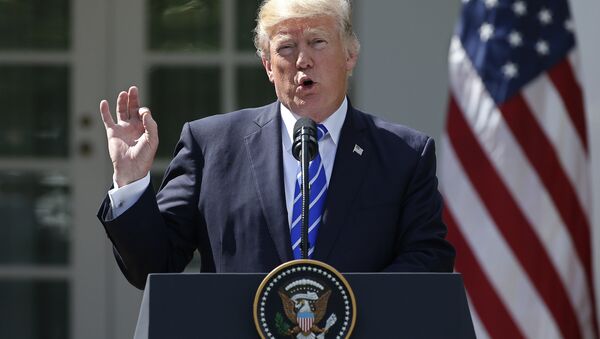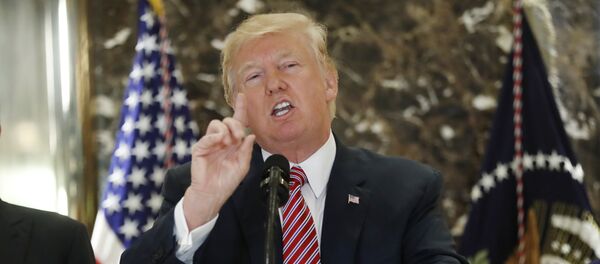Kristian Rouz — President Donald Trump unveiled his tax reform proposal, proposing the widest fiscal overhaul since 1986, yet again igniting the debate over budget revenue neutrality and government debt. While the proposed plan is poised to boost US economic growth, its positive effects on the economy will not be immediate. The President will thus face an uphill political struggle in Congress, dealing with hostile Democrats, and unfriendly Republicans.
President Trump outlined his tax proposals during an event in Indiana on Wednesday, and said the 20 percent corporate tax (down from 35 percent previously) is "a perfect number." He had previously insisted corporate tax should be decreased to 15 percent, but the actual number is a result of compromise between the President and a GOP establishment concerned with revenue neutrality.
President Trump says US businesses will pay the lowest taxes in roughly a century, which will allow them to increase capital investment, and workforce expenditures. This, in turn, will bolster employment and put upward pressure on stagnant salaries and wages.
"Tax reform will protect low-income and middle-income households, not the wealthy," President Trump said. "They can call me all they want. I'm doing the right thing, and it is not good for me. Believe me, it's not. "What is good for me, is if everything takes off like a rocket ship."
Trump says the 20-percent corporate tax rate will give the US economy a competitive edge over other advanced nations in international trade. However, fiscal measures only are not enough. They need to be accompanied by a coherent set of monetary, currency, and trade policies — yet, the corporate tax cut is a step in the right direction within the broader reform framework.
Currently, the lowest tax rate is 10 percent, and the highest is 39.6 percent, however, the existing individual income tax filing process is complicated, and these brackets do not reflect the actual amount of money paid in taxes.
The plan doubles standard deductions of $12,000 for singles and $24,000 for married couples filing together. The tax filing process eliminates credits and deductions, which means an actual hike in income tax for those who exploited loopholes or relied on deduction claims to pay lower taxes.
Congress has an option to enact a fourth tax bracket, the highest, for the ultra-wealthy, if deemed necessary — this is also poised to stave off the debate over revenue neutrality.
President Trump is now facing a tough standoff with Congress. Even though the Republican establishment generally supports the plan, the GOP has not produced a single legislative result since the President took office in January. The intra-party divisions, sudden changes in mind amongst GOP senators and congressmen have hindered the legislative effort in the Republican-controlled Congress.
Democrats firmly oppose any initiative of President Trump, however, some party members have expressed their willingness to work on the tax plan with the President.
"Tax reform has not historically been a partisan issue — and it does not have to be a partisan issue today," Democratic Senator Joe Donnely of Indiana said. "There is no reason that Democrats and Republicans in Congress should not come together to deliver this giant win for the American people and begin the 'middle class miracle' once again."
The plan is estimated at releasing about $5.8 trillion into the economy over the coming ten years, and its net costs — at the current pace of economic growth and within existing economic structures — are roughly $2.2 trillion through year 2027.
With the infrastructure package still undecided, many structural issues in the economy unaddressed — most prominently, the remaining excessive regulation — and the pace of monetary policy uncertain after February 2018, the tax plan alone might be insufficient to produce a miracle. Particularly so, as the US economy was last in a recession eight years ago within the typical ten-year business cycle.






